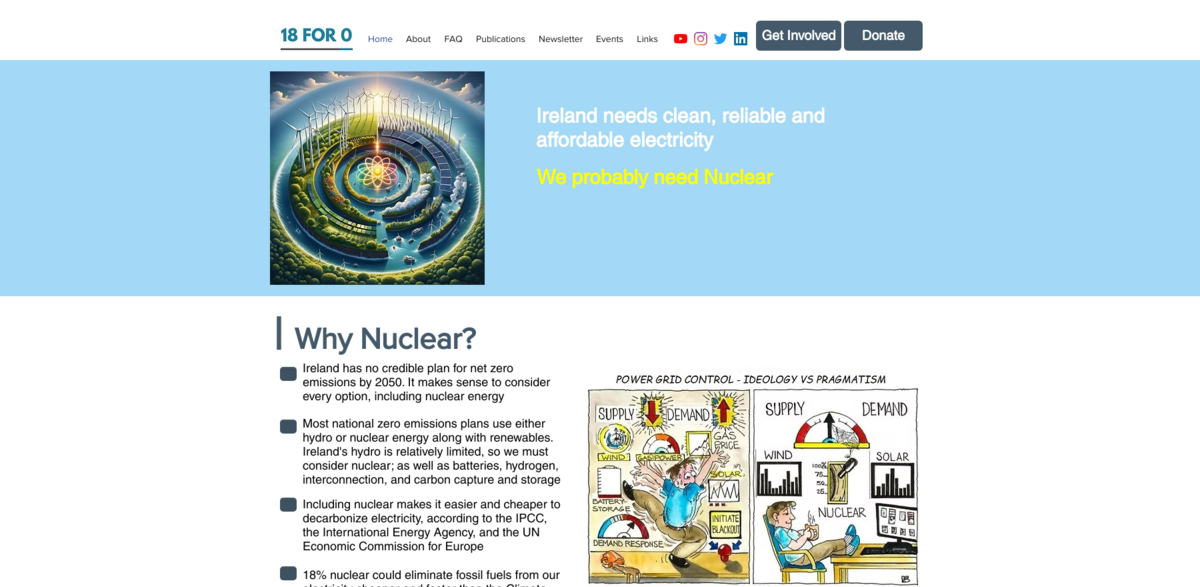What is 18for0?
18for0 is an Irish non-profit group made up of volunteers with deep experience in energy and related fields. They’re genuinely concerned about the credibility of Ireland’s current climate plans. Their mission? To inform the public and policymakers about how nuclear energy could be a game-changer for Ireland’s clean energy future. The group argues that including nuclear power in Ireland’s energy mix is vital for creating a credible, reliable, and affordable plan to meet the country’s electricity needs while hitting net zero emissions by 2050.
The Main Benefit of Considering Nuclear Energy
Here’s the deal: Ireland needs clean, reliable, and affordable electricity. And honestly, nuclear energy might just be the missing piece of the puzzle. Check out these key points:
- 18% nuclear energy could eliminate fossil fuels from Ireland’s electricity supply faster and cheaper than the current Climate Action Plan.
- Most national zero emissions plans worldwide include either hydro or nuclear power alongside renewables.
- Ireland’s hydro resources are limited, so nuclear becomes a crucial option.
- International bodies like the IPCC, International Energy Agency, and UN Economic Commission for Europe agree: including nuclear makes decarbonization easier and more affordable.
- Without nuclear, Ireland has almost no chance of meeting its emissions limits by 2050.
Why Nuclear? Why Now?
Let’s be real — Ireland currently has no credible plan to reach net zero emissions by 2050. Most countries rely on a mix of renewables plus either hydro or nuclear power to get there. Since Ireland’s hydro potential is pretty limited, nuclear energy deserves serious consideration. It’s the world’s safest and most-used clean energy source, yet it’s strangely excluded from Irish government studies and policies. That exclusion feels… well, reckless, especially when the clock is ticking on climate targets.
What Needs to Happen Next
For Ireland to have a shot at a zero carbon future, some clear steps are necessary:
- Stop excluding nuclear power from studies on zero emissions pathways for Irish energy by 2050.
- Assess all net zero pathways, including those with nuclear power, to understand which options can realistically meet emissions limits.
- End laws that outright ban nuclear power stations in Ireland — these laws currently block scientific research into nuclear’s viability here.
Without these changes, Ireland risks missing its climate goals and continuing down a costly, uncertain path.
How 18for0 Supports Ireland’s Energy Future
18for0 focuses on educating and informing the public and decision-makers about nuclear energy’s potential role. They highlight how deriving 18% of Ireland’s electricity from nuclear could deliver the fastest, cheapest transition to zero carbon electricity by 2040. This timeline is on par with other clean energy technologies the government is considering — but nuclear is often more certain and affordable. The group’s work aims to open up the conversation and push for a science-based approach to Ireland’s energy future.
Project Impact on Sustainable Development Goals (SDGs)
- SDG 7: Affordable and Clean Energy — promoting reliable, clean electricity through nuclear power.
- SDG 13: Climate Action — supporting credible pathways to reduce emissions and combat climate change.
- SDG 9: Industry, Innovation, and Infrastructure — encouraging advanced energy technologies and infrastructure development.
- SDG 11: Sustainable Cities and Communities — enabling cleaner, healthier environments through reduced pollution.
- SDG 12: Responsible Consumption and Production — fostering sustainable energy production methods.
Looking Ahead: The Future of Ireland’s Energy
The conversation about Ireland’s energy future is far from over. With climate targets looming, it’s clear that sticking to the current plan — which excludes nuclear — might not cut it. 18for0’s message is simple: it’s time to stop ignoring nuclear power and start seriously exploring all options. After all, a clean, affordable, and reliable energy future isn’t just a nice idea — it’s a necessity. And nuclear energy could very well be the key to unlocking that future.


















